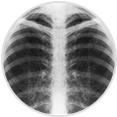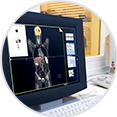Testing for Mesothelioma
Testing for mesothelioma is a long, complex process that typically
involves multiple cancer specialists and a series of diagnostic tools.
The most widely used tests include imaging scans, biopsies and blood
tests.
Imaging scans help doctors visualize abnormal growths on the body’s tissues and organs. Some even show areas with high metabolic activity, which suggest cancer may be present.
The most accurate test for confirming a diagnosis is biopsy, a procedure where doctors remove fluid or tissue samples and study them under a microscope. Researchers also are exploring a variety of blood tests for substances that indicate mesothelioma, but currently none are accurate enough to confirm a diagnosis on their own.




CT scans are most doctors' first choice, while the "gold standard"
for mesothelioma diagnosis is a combination CT-PET. However, many
mesothelioma diagnoses are made incidentally, when doctors use other
types of scans to identify an unknown condition.
Most doctors’ first choice when testing for mesothelioma is a CT scan, but the current “gold standard” is a combination PET-CT scan. With results from both tests, doctors can get a detailed look inside the body and see whether suspicious growths are cancerous or noncancerous. Potentially cancerous growths will light up on PET scans, but not on CT scans or MRIs.
Most of the time, doctors discover mesothelioma incidentally when they use other types of scans to identify an unknown condition.
Imaging scans help doctors visualize abnormal growths on the body’s tissues and organs. Some even show areas with high metabolic activity, which suggest cancer may be present.
The most accurate test for confirming a diagnosis is biopsy, a procedure where doctors remove fluid or tissue samples and study them under a microscope. Researchers also are exploring a variety of blood tests for substances that indicate mesothelioma, but currently none are accurate enough to confirm a diagnosis on their own.
Imaging Tests
Oncologists use imaging tests to check for visible signs of tumors. A mesothelioma diagnosis relies on a series of diagnostic imaging tests, including:
X-Rays
Produce basic images of dense areas within the body (such as tumors)
CT Scans
Use electromagnetic imagery to create detailed images of internal structures
MRIs
Generate images of highly active internal structures using magnets and radio waves
PET Scans
Highlight areas of the body that have abnormally high, potentially cancerous metabolic activityMost doctors’ first choice when testing for mesothelioma is a CT scan, but the current “gold standard” is a combination PET-CT scan. With results from both tests, doctors can get a detailed look inside the body and see whether suspicious growths are cancerous or noncancerous. Potentially cancerous growths will light up on PET scans, but not on CT scans or MRIs.
Most of the time, doctors discover mesothelioma incidentally when they use other types of scans to identify an unknown condition.
Fast Fact In a study of 31 mesothelioma patients,
PET-CT scans correctly diagnosed 20 cases, incorrectly diagnosed nine
cases; and could not determine two cases. MRI imaging correctly
diagnosed both undetermined cases in a follow-up scan.
If you are scheduled for a diagnostic imaging scan:
- Assemble the same personal documents you collected for your first diagnostic appointment.
- Plan for a one- to two-hour appointment.
- Follow any pre-scan guidelines provided by your doctor (such as fasting from food or water).
- Research relaxation techniques if you are nervous about being in an enclosed scanning machine.
- Plan to hear the results from your doctor within one to two weeks of the appointment.
Biopsies
Biopsies
are small fluid or tissue samples doctors send to a laboratory for
evaluation when testing for mesothelioma. These tests can reveal whether
a growth is cancerous, where in the body the cancer originated and what
type of cells are involved. The cancer's location and cell type play a
major role when it comes to planning treatment.
Thoracoscapy is considered the most accurate diagnostic biopsy for mesothelioma. This method allows doctors to look into the pleural cavity and retrieve high-quality biopsy samples; it can result in accurate diagnosis for up to 98 percent of mesothelioma patients.
Doctors can retrieve biopsy samples in several different ways:
Fine-Needle Aspiration
Extracts cells through a thin, hollow needle and a syringe.Thoracoscopy
Takes samples with a camera-equipped tube that doctors insert through the chest wall.Mediastinoscopy
Mediastinoscopies are similar to thoracoscopies, except doctors insert the tube through an incision in the neck.Incisional/Core
Incisional/core biopsies are similar to fine-needle biopsies, but use a wider needle to obtain larger samples.Excisional
Excisional biopsies remove the whole tumor from the body and test selected samples from the mass.Thoracoscapy is considered the most accurate diagnostic biopsy for mesothelioma. This method allows doctors to look into the pleural cavity and retrieve high-quality biopsy samples; it can result in accurate diagnosis for up to 98 percent of mesothelioma patients.
No comments:
Post a Comment